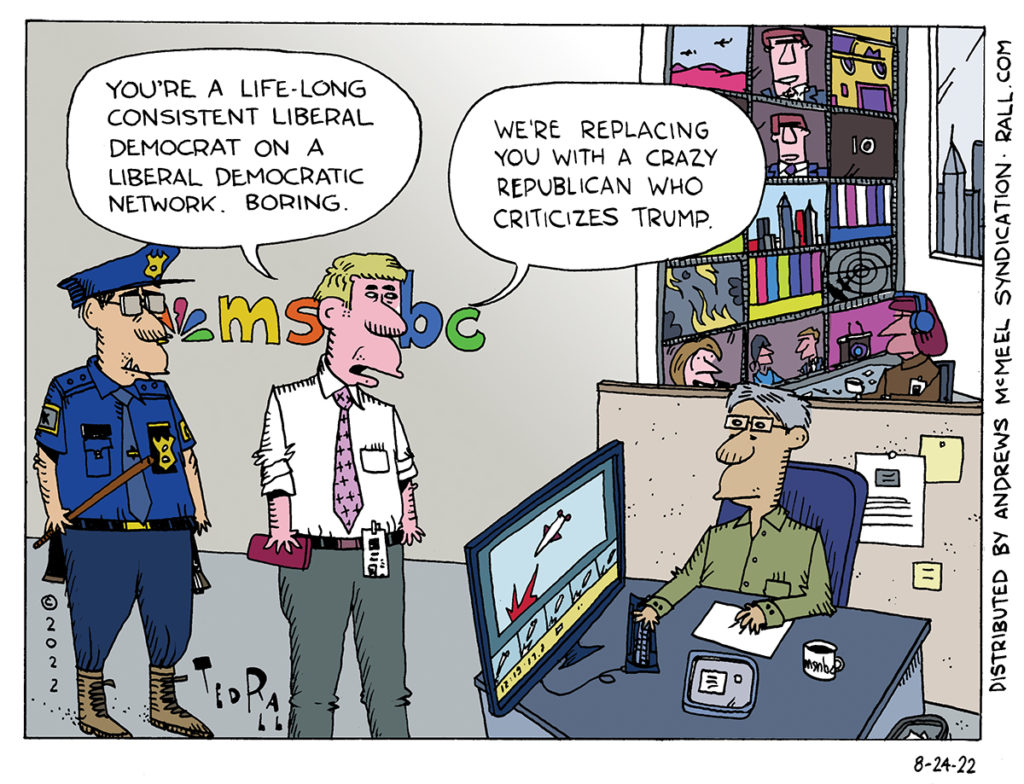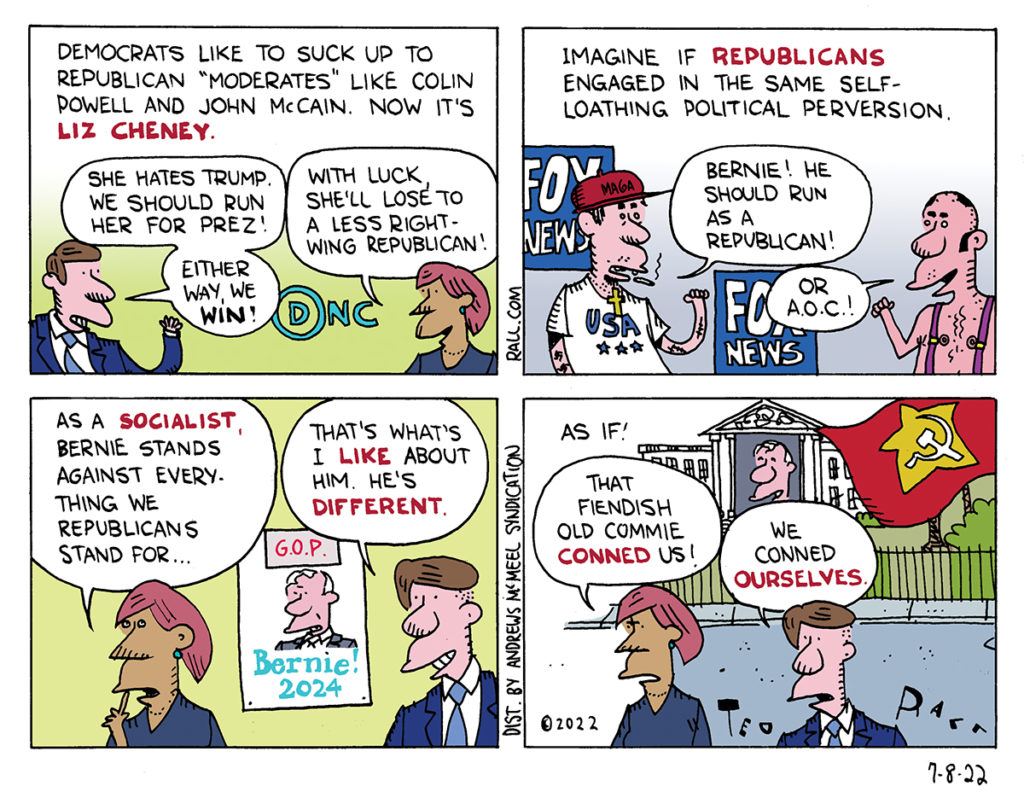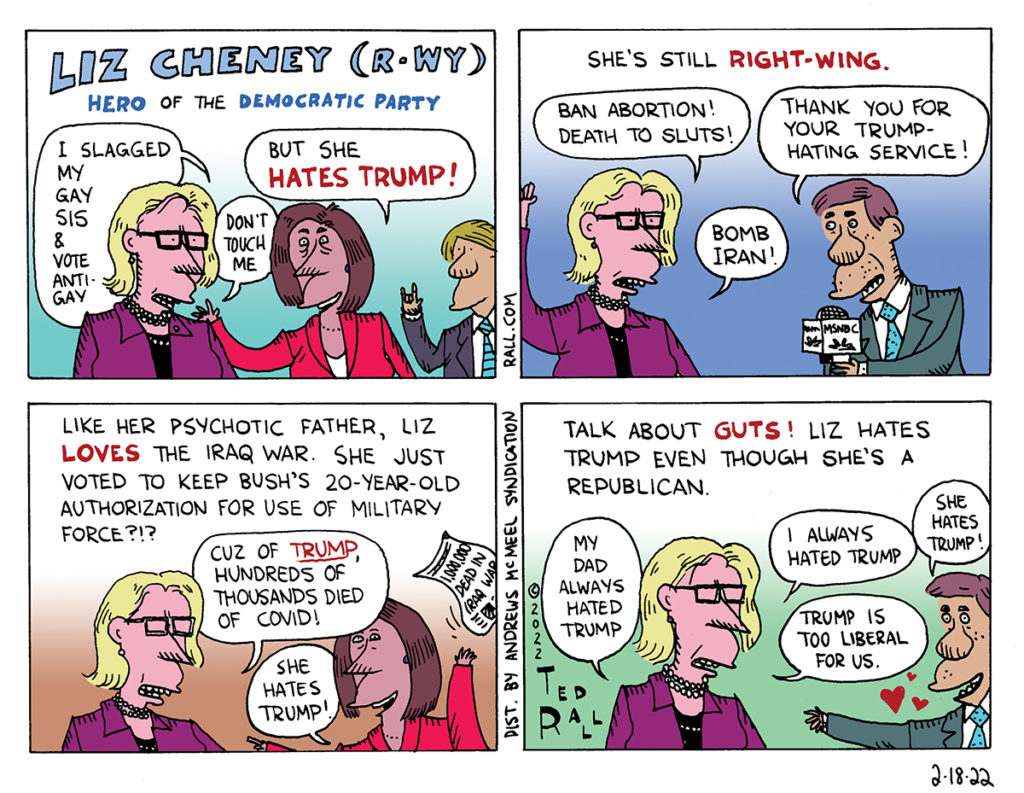One of the more puzzling decisions of the Kamala Harris presidential campaign was to make numerous appearances with Liz Cheney, the far right neoconservative who is despised universally both by Republicans and Democrats. Now that Trump has prevailed, in part due to decisions like this, it’s likely that the blossoming friendship isn’t what it used to be.
Neither Democrats Nor Republicans Can Defeat Trumpism

As you know if you are one of my regular readers, I’m skeptical of hysterical claims that Donald Trump and his supporters represent a uniquely existential threat to democracy and the American way of life. Right-wing populist demagogues are a recurring feature of American history; there is nothing new here. Many “mainstream” politicians have promoted and promulgated policies that stepped over the line into fascism: the Red Scares of the Palmer raids and McCarthyism, concentration camps for Japanese Americans, the John Birch society, COINTELPRO, mass surveillance by the NSA, George W. Bush’s war of aggression against Iraq and assassination drones come to mind.
Trump had four full years in office, one of which was marked by a bona fide national emergency, the COVID-19 pandemic, that he might have exploited to impose martial law, yet the republic still stands.
Trump notwithstanding, it is true that democracy, even the watered-down worn-out version of our ancient republic, is fragile. Those wary of authoritarianism can never be too vigilant. So I’m always interested in what people perceive as a threat to the current system – and what they fail to see.
New York Times writer David Leonhardt is an intelligent mainstream subscriber to Trump Derangement Syndrome. The former president, he argues, represents a double-barreled attack on American democracy. First, Trump’s refusal to accept his loss to Joe Biden spreads the virus of delegitimization. If nothing else, elections are supposed to settle the question of which candidate is most popular. If they don’t, what’s the point of holding them?
The second threat, Leonhardt says, is that “the power to set government policy is becoming increasingly disconnected from public opinion.” The far-right Supreme Court, gerrymandering, the Senate filibuster, voter suppression and the Electoral College result in laws and rulings to the right of what most voters want.
The sore loser concern seems overblown. Disputed elections followed by large segments of the population who refused to accept the results have occurred repeatedly. 42% of Republicans thought Obama was born in Kenya, meaning that he was unqualified to run for president. 85% of Democrats said they believed Bush cheated in the 2000 election. Conservatives thought JFK cheated Nixon out of a win in 1960 and strongly disapproved of FDR’s decision to break tradition and run for a third term in 1940. Rutherford B. Hayes became president in 1876 but there’s no doubt that his ascent to the White House was the result of the most scurrilous skullduggery imaginable. Trump’s bitching is hardly unprecedented.
The gap between the right-wing politics of Congress and the Supreme Court and a relatively left electorate is mitigated by the decision of most liberals to live where their values are codified by legislation; New Yorkers, after all, still have abortion rights. Though blue staters may feel anger and sympathy for women who can’t get the procedure in the Deep South, those emotions are academic rather than visceral. Pitchfork-wielding liberals won’t be a thing any time soon.
My apologies for burying the lede, but the we-are-in-unusual-peril argument that leaps out at me is that “mainstream” corporatist—read, non-populist, country-club—Republicans are in bed with Trump… and that that makes all the difference. Leonhardt quotes Harvard Professor Steven Levitsky, co-author of the book “How Democracies Die.”
“When mainstream parties tolerate these guys, make excuses for them, protect them, that’s when democracy gets in trouble,” Levitsky says. “There have always been Marjorie Taylor Greenes. What I pay closer attention to is the behavior of the Kevin McCarthys.” Republican House Leader McCarthy, he points out, has backed up Greene despite her violent rhetoric.
Leonhardt correctly points out that something similar happened during the 1930s in Germany and other European countries. Hitler came to power with the support of traditional conservative parties whose leaders thought they could control the “Austrian corporal.” These louche establishmentarians “typically do not initiate attacks on democratic rules or institutions but who also do not attempt to stop these attacks. Through their complicity, these semi-loyal actors can cause a party, and a country, to slide toward authoritarianism.”
For decades Democrats have moaned: why don’t “respectable” Republicans speak out against the extremist Birchers/Klansmen/neoconservatives/Proud Boys/Trumpies/QAnoners in their midst?
The answer is that right-wing extremism is not a fringe group.
It is the Republican base.
Racism, xenophobia, homophobia, supporting violent policing are all baseline beliefs of the “mainstream” GOP. Far-right groups like those who gathered for the Unite the Right rally in Charlottesville provide the muscle, intellectual grounding and excitement for a Republican Party that without them would be doomed to permanent minority status. “Acceptable” Republicans like McCarthy and Mitch McConnell aren’t so much afraid of being voted out or physically assaulted if they were to criticize Trump as they are afraid of losing a vital part of their party constituency.
The few Republicans who criticize Trump and by extension the right-wing populist wing of the party commit personal political suicide and risk destroying their basic coalition. Liz Cheney aside, it’s not going to happen. Anyway, Cheney is an outlier who recognizes that her future is to get hired by MSNBC as a token fake Republican.
Returning to the rise of Nazism, the only real threat to Hitler and his goons in the 1930s was Germany’s left-wing parties, the communists and the socialists. Left-wing parties maintained paramilitary organizations that took on the Nazi brownshirts in the streets. With over 30% of the vote between them—1.5 million votes more than the Nazis—German leftists were numerous and militant enough to hold the Nazis at bay at the ballot box as well as in the streets.
Tragically and stupidly, however, the less militant socialists refused to join an alliance of convenience with the communists. Writing from exile, communist Leon Trotsky asked German socialists: “The policies of our parties are irreconcilably opposed; but if the fascists come tonight to wreck your organization’s hall, we will come running, arms in hand, to help you. Will you promise us that if our organization is threatened you will rush to our aid?” As the SPD dithered, the Nazis seized power with the complicity of traditional conservative parties. When socialists and communists finally came together, it was as inmates in Nazi concentration camps.
There is no point clinging to the foolish Democratic hope that corporate Republicans will cut Trumpies loose. The lesson of the 1930s is that the only force that can defeat an energetic and well-organized far right (and its Republican Party allies) is an energetic and well-organized far left.
(Ted Rall (Twitter: @tedrall), the political cartoonist, columnist and graphic novelist, co-hosts the left-vs-right DMZ America podcast with fellow cartoonist Scott Stantis. You can support Ted’s hard-hitting political cartoons and columns and see his work first by sponsoring his work on Patreon.)
DMZ America Podcast #62: Liz Cheney, Sarah Palin and the Midterms, Salman Rushdie and Personal Political Violence, Superhero Movies and the Cancellation of Bat Girl
Two of America’s top editorial cartoonists sit down to discuss the future of Republican firebrands Liz Cheney and Sarah Palin. Then they talk about the horrible knife attack on author Salman Rushdie and their own experiences with political violence aimed at them and other US political cartoonists. Finally the two get into how much they love/hate superhero movies, (can you guess which one holds which opinion?).
Liz Cheney, Hero of the Democratic Party
Politics makes strange bedfellows and the enemy of my enemy is my friend but Congressional Democrats’ love of right-wing lunatic Liz Cheney has completely gone off the rails. Yes, she hates Trump but that doesn’t mean she has any integrity.
Can’t They Both Die?
Because she criticized Donald Trump for refusing to accept the results of the election, many Democrats supported Wyoming Congresswoman Liz Cheney in her battle to retain her leadership position in the House. Weirdly, they ignored her reprehensible politics, such as the fact that she has never met a war that she doesn’t like. Just another reminder that it’s OK to hate both sides in a fight.
Trump Tries to End the Afghanistan War, Democrats Want to Keep Killing

Pollsters have observed a consistent enthusiasm gap between supporters of President Trump and former Vice President Joe Biden. Any factor that dampens Democratic turnout could contribute to a second come-from-behind victory for the GOP.
Adding to liberal voters’ ambivalence over Biden is a rarely-discussed aspect of Trump’s presidency. Trump’s skepticism of foreign military entanglements places him to the left of mainstream Democrats like Biden. His foreign policy aligns more closely to those of the progressives who are licking their wounds from the primary defeat of Bernie Sanders—and who are considering whether or not to vote at all.
In 2016 Trump upended traditional right-wing politics by campaigning against the Iraq War—during the Republican primaries, where candidates usually compete to look tough. This year the surprise dove can take credit for extricating the U.S. from its longest war, the 18-year-old meatgrinder of Afghanistan. Not only was Trump the first post-9/11 president to hold direct talks with the Taliban, he concluded a peace deal with the insurgency that leads to a total American withdrawal by April 2021 if the Taliban uphold their commitments. Now he is even considering an accelerated timetable that would bring back the last American soldier before Election Day.
Enter the war pigs.
Trump’s peace initiative is under attack by an odd coalition of neoconservative Republicans including Rep. Liz Cheney of Wyoming and a group of Democratic hawks who inserted an amendment to the latest National Defense Authorization Act. The add-on denies the president funding to bring back the last 8,000 troops. In order to get the money the Defense Department would have to certify that pulling out would not increase the chances of Afghanistan ever becoming a safe haven for terrorists in the future. How could they promise that?
“There were elements of the progressive left and the pro-Trump right who supported these withdrawals,” Glenn Greenwald noted in The Intercept, but they lost the House fight.
Trump is no one’s idea of a pacifist. He expanded the drone assassination program he inherited from Obama and reduced its already low transparency. He supports Saudi Arabia’s vicious proxy war in Yemen. He has engaged in old-fashioned gunboat diplomacy against China.
Even so, many progressives find more to like in Trump’s willingness to engage with the leaders of countries like North Korea and Iran. Prior to Trump, high-level negotiations were positioned by the U.S. as rewards for improved behavior; Trump talks without preconditions. Progressives prefer diplomacy to war.
Biden, on the other hand, voted to bomb Serbia, invade Afghanistan and Iraq. He has never apologized—so it’s reasonable to assume he’d commit the same crimes again. He sat at Obama’s side as that administration armed and funded radical jihadis in Libya and Syria, expanding regional conflicts into all-out civil wars, one of which created the vacuum filled by ISIS. American leftists support Nicolás Maduro, a socialist, in Venezuela; Biden backs Juan Guaidó, who failed to seize power in a military coup last year. These are Hillary Clinton’s politics, an approach left-leaning voters despise.
“The liberal establishment is desperate to return a centrist to the White House in November and reestablish the country’s more stable military dominance of the world order, disrupted only briefly by Donald Trump. Joe Biden’s terrible track record on foreign policy — including his championing of war in Iraq — suggests a return to Obama-style strong military interventions abroad,” David Davison and Alex Thurston wrote recently in Jacobin.
“Biden represents the return of the classical foreign policy establishment,” Alan Minsky, executive director of Progressive Democrats of America, told The Progressive magazine. “Biden is running a campaign as a restoration candidate.”
And while Biden has made overtures to the progressive wing of his own party on such domestic issues as healthcare and the environment, he has expressed no willingness to compromise on foreign policy.
Last week a coalition of progressive groups wrote to Biden to demand that he appoint anti-interventionists to his cabinet and as top officials in the State Department. “Without national security and foreign policy personnel who are willing to learn from the mistakes of the past and understand the need for change this moment presents, we fear our country—and the world—risk descending into climate and economic chaos fueled by further corruption and authoritarianism. We expect a potential Biden administration to reflect the urgency of this moment in its personnel appointments,” the letter read.
I would not hold my breath.
(Ted Rall (Twitter: @tedrall), the political cartoonist, columnist and graphic novelist, is the author of the biography “Political Suicide: The Fight for the Soul of the Democratic Party.” You can support Ted’s hard-hitting political cartoons and columns and see his work first by sponsoring his work on Patreon.)





